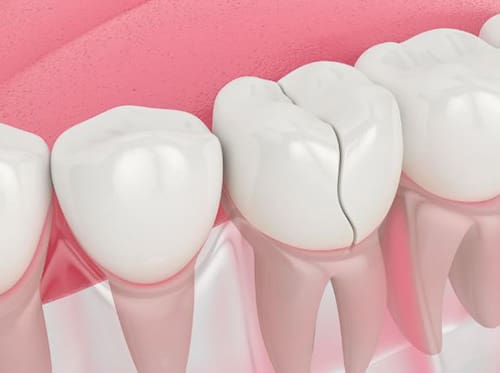
Cracking a tooth can be a scary and uncomfortable experience. Whether it happens while biting into something hard, from grinding your teeth, or due to an injury, a cracked tooth should never be ignored. Even a small crack can lead to bigger dental problems if left untreated.
So, if you’ve just discovered a crack in your tooth — or suspect something isn’t quite right — here’s what you need to know and how you should proceed.
How Do I Know If My Tooth Is Cracked?
Sometimes, a cracked tooth is easy to spot. You might feel a sharp edge with your tongue or even see a visible line in the mirror. In other cases, the signs can be more subtle. Here are some common symptoms:
- Pain when chewing or biting, especially when releasing pressure
- Sensitivity to hot, cold, or sweet foods and drinks
- Occasional discomfort that comes and goes
- Swelling around the affected tooth
- A feeling that something is “off” when you bite down
If you’re experiencing any of these symptoms, even without visible damage, it’s a good idea to schedule a dental appointment right away.
Types of Tooth Cracks
Understanding the type of crack you have can help your dentist determine the best course of treatment. Common types include:
- Craze lines – Tiny surface cracks in the enamel. These are usually painless and cosmetic.
- Fractured cusp – A crack around a filling that may cause minor discomfort.
- Cracked tooth – A crack that extends from the chewing surface down toward the root. This type can get worse over time.
- Split tooth – A tooth split into two distinct parts, usually from an untreated cracked tooth.
- Vertical root fracture – A crack that starts in the root and works upward, often without noticeable symptoms until it becomes serious.
What Should I Do Immediately?
If you think you’ve cracked a tooth, here are some immediate steps to take:
- Call your dentist as soon as possible – Even if the pain isn’t severe, early treatment can prevent further damage.
- Rinse your mouth with warm water – This helps keep the area clean and reduces the risk of infection.
- Avoid chewing on the affected side – Stick to soft foods and avoid anything hard or sticky.
- Use over-the-counter pain relief – If you’re experiencing discomfort, medications like ibuprofen can help manage pain and inflammation.
- Apply a cold compress – If there’s swelling, applying a cold pack to the outside of your cheek can help reduce it.
How Will the Dentist Treat a Cracked Tooth?
Treatment depends on the type and severity of the crack. Here are the most common options:
- Bonding – For small cracks, your dentist can apply a tooth-colored resin to fill the crack and restore the tooth’s appearance.
- Dental crown – A crown is often used to cover and protect a cracked tooth, especially if the crack is deeper or affects chewing.
- Root canal – If the crack extends into the pulp (the inner tissue of the tooth), a root canal may be necessary to remove damaged tissue and save the tooth.
- Tooth extraction – In cases where the tooth is severely split or beyond repair, it may need to be removed.
Your dentist will take X-rays and perform a thorough examination to determine the best plan of action.
Why Prompt Treatment Matters
Delaying treatment for a cracked tooth can lead to bigger problems, including:
- Worsening of the crack
- Infection or abscess
- Tooth loss
Acting quickly can preserve your natural tooth and prevent more extensive (and costly) procedures down the line.
Prevention Tips
While not all cracks are avoidable, you can lower your risk with a few preventive measures:
- Avoid chewing hard foods like ice or unpopped popcorn kernels
- Wear a mouthguard during sports
- Use a nightguard if you grind your teeth while sleeping
- Maintain regular dental check-ups to catch problems early
If you’ve cracked a tooth, don’t panic — but do act quickly.
A cracked tooth doesn’t always mean you’ll lose it, especially if you seek treatment early. Your dentist can guide you through the best options to relieve discomfort, restore your tooth, and protect your smile for the future.
If you suspect a crack, reach out to your dental provider as soon as possible. A small crack today could become a big problem tomorrow — but with timely care, your tooth can be healthy and pain-free again.
